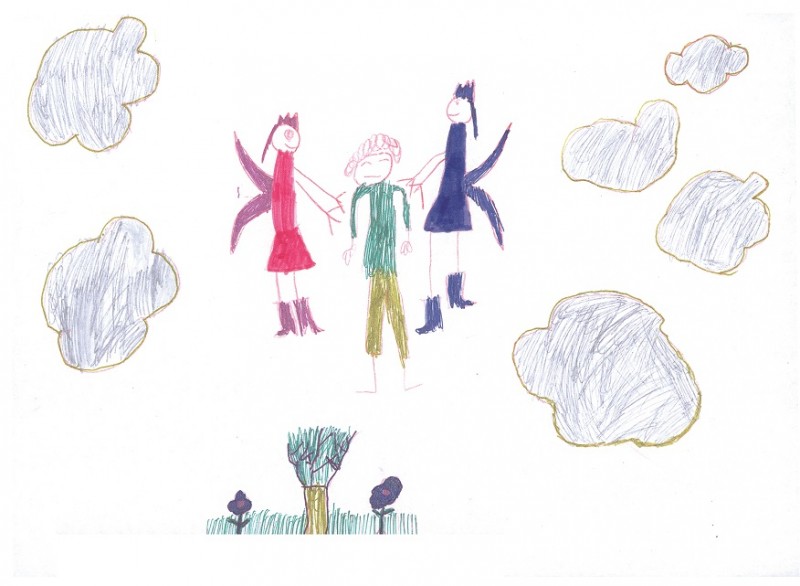Saying Goodbye - The Funeral

After the sudden and unexpected death of a child, it can be very difficult for you to make decisions around what is best for your surviving children. Should they be given the opportunity to say ‘goodbye’ to their brother or sister, or will they find it too upsetting? Should they be encouraged to attend the funeral or service, or are they too young to understand? Every person responds differently and whatever you may decide about your child’s involvement is the right decision for you.
Some parents may find it too hard to deal with the reality of the death themselves and so may assume that their children cannot cope with such an experience. Adults may believe they are protecting children by leaving them out of the discussions and rituals associated with the loss. However, most bereaved parents say they are pleased that they involved their children.
“The nurse at the hospital was terrific. She asked us if we wanted the boys brought in. I’m so glad she said we could do this. They hugged and kissed him.” (Sharon)
“Jesse was on life support for 18 days. Aaron came in twice to see him. Holly and Kitty came in once. Aaron was smart and knew what was going on. He would just sit with Jesse. Holly just drew. Kitty held onto and felt his foot. She said, “I don’t understand. I thought hospitals made people better, but Jesse died.” (Alex)
“Give the kids choices. If they want to see their brother or sister, let them.” (Sharon)
“Natasha held them after they died. She stroked their hair and sang to them, just as I had done.” (Natalie C.)
If a child is away when their sibling dies, it is very important to bring them home, difficult as it is, to be part of the grieving and planning from the beginning.
The funeral
Rituals are a part of life and can be of enormous help in building memories of the child who died. You may like to consider allowing children who are old enough, or who express a wish to do so, to be included in memorial services. It is important to explain to your child beforehand what a funeral is. It is also important to mention that rituals such as this give your grieving family and friends a time and place to remember the child who died. It is an opportunity to say good-bye.
“People need to prepare children for what they will see and what will happen. Tell them what to expect. My children got a shock when they saw the little coffin. They expected to see a large, adult coffin.” (Alex)
“The funeral director gave us a lot of good advice. We saw Lewis twice at the funeral parlour. Jacob held him and helped to dress him. He decorated the inside of the coffin with stars.” (Kath)
“Kids might do unexpected things. During the funeral, Jacob just walked up to Lewis’ coffin, rearranged a couple of things on the top - and then just walked back to the seat. They don’t have to sit still like adults.” (Kath)
“Kids need to be there (at the funeral). Don’t leave it up to the child to decide. I think each child has to be there. Aaron saw the coffin go underground. The girls didn’t see that. Children might get angry if they are not included.” (Alex)
“I don’ think you can make any hard and fast rules about whether children should go to the funeral. Hannah did go to the funeral. She had no idea about what was happening, but I’m glad she went. For the rest of her life it will mean something to her that she was included.” (Jenny)
“I’m not really glad (that I went to the funeral).” (Matthew aged 8)
“After Molly died, Dan and Tim did not want to see her in a white box. Molly’s funeral was different. We didn’t want to see her in a coffin, so she was placed in a bassinet with the netting over it. She was cremated and we have her ashes above the fireplace in the kitchen. We had a party for Molly, and the boys enjoyed that because a lot of their friends came and they felt surrounded and supported.” (Jill)
“Someone suggested that Jarrod write a letter or do a drawing to put in the casket. That seemed to be good for Jarrod. We included Jarrod in everything, I think you should listen and give the children choices about what they can do” (Kylie)
This article was prepared using extracts from What about the Other Kids?1 The full text is available online or contact Red Nose Grief and Loss Services on 1300 308 307 for a printed version.
Last reviewed: 18/9/25
Share
1. Bereaved Parents & SIDS and Kids. (2005). What About the Other Kids? A Booklet by and for Parents of Children whose Brother or Sister has Died (D. Same, Com., M. Bannan, A. Faulkner, J. Foong, S. Foong, J. Frisina, L. Green, R. Green, …& H. Wilson, Illus.). Malvern, Vic.: SIDS and Kids.



